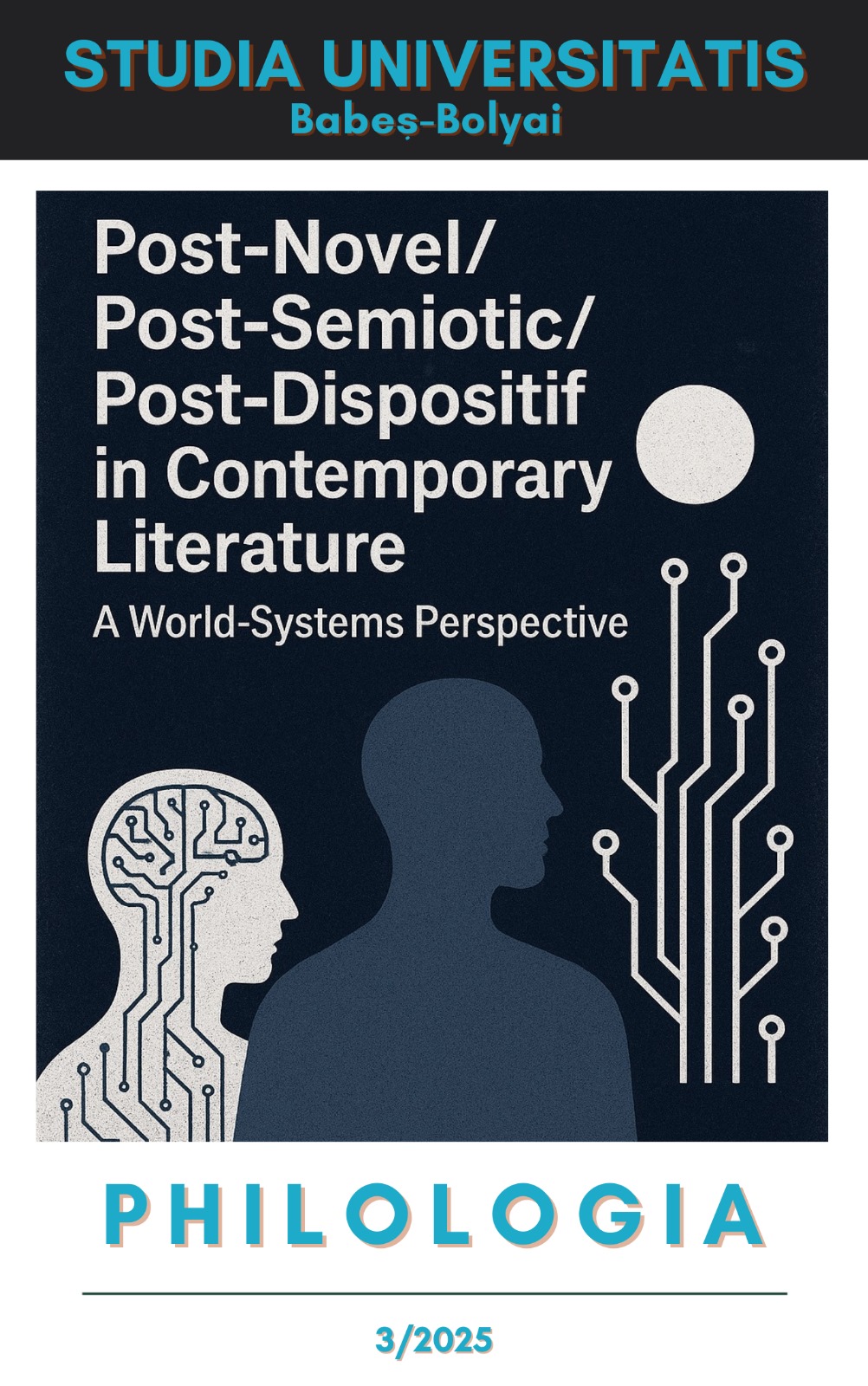THE NOVEL GOES UTOPIA: ON VOLODYMYR VYNNYCHENKO’S THE SUN MACHINE
DOI:
https://doi.org/10.24193/subbphilo.2025.3.02Keywords:
novel, “global novel”, utopia, Ukrainian fiction, world-literary theoryAbstract
The Novel Goes Utopia. On Volodymyr Vynnychenko’s The Sun Machine. This article contributes to the project of “un-noveling” literary theory by drawing attention to the homogenizing tendency in (world-)literary theory, caused by its strong focus on the genre of the novel, however global and all-encompassing that genre may be understood. In order to discern the limits and limitations of the novel, it is examined in opposition to utopia. In particular, a discussion of Volodymyr Vynnychenko’s bestselling “utopian novel” The Sun Machine (1928) and its critical reception draws out a host of critical-theoretical presuppositions related to the novel and questions of aesthetics, politics and narrative. An “unnovelistic” genre of utopia also invites a brief discussion of the semiotic method of reading (for) utopia and the problem of binary oppositions for literary theory more generally. It is through these two angles that the article proposes to address the overarching theme of the special issue, post-novel, and one of its sub-interests – the interpretive methods grounded in semiotics.
REZUMAT. Romanul spre calea utopiei. Despre Mașina Soarelui de Volodymyr Vynnychenko. Acest articol contribuie la proiectul deconstrucției genului romanesc în teoria literară prin descrierea tendinței de omogenizare din teoria (mondial-)literară, cauzată de focalizarea acesteia asupra genului romanesc, oricât de global și atotcuprinzător ar fi acesta înțeles. Pentru a discerne limitele și limitările romanului, acesta este examinat în opoziție cu utopia. În special, o discuție a „romanului utopic”, bestsellerul Mașina Soarelui (1928) de Volodymyr Vynnychenko și a receptării sale critice, scoate la iveală o serie de presupoziții critico-teoretice legate de roman și de chestiuni de estetică, politică și narațiune. Un gen non-romanesc al utopiei invită, de asemenea, la o scurtă discuție despre metoda semiotică de a citi (pentru) utopie, dar și despre problema opozițiilor binare în raport cu teoria literară în general. Prin aceste două perspective, articolul propune abordarea temei generale a numărului special, post-romanul, și a unuia dintre sub-interesele sale – metodele interpretative întemeiate pe semiotică.
Cuvinte-cheie: roman, „roman global”, utopie, ficțiune ucraineană, teorie literară mondială.
Article history: Received 15 June 2025; Revised 31 August 2025; Accepted 05 September 2025; Available online 24 September 2025; Available print 30 September 2025
References
Barnard, Philip, and Stephen Shapiro. 2022. “Un-Noveling Brown: Liberalism and Its Literary Discontents.” Early American Literature 57.2: 549-554.
Bekhta, Natalya. 2023. “Thomas the Baboon and Utopia: Constructing a Realistic Future.” On_Culture: The Open Journal for the Study of Culture 15: 1-22.
Bekhta, Natalya. 2025. “Beyond the Novel. Satire in Eastern Europe and Volodymyr Rafeyenko’s Mondegreen.” Critique: Studies in Contemporary Fiction 66.1: 12-22.
Biletskyi, Oleksandr. 1990 [1928]. «Сонячна машина Володимира Винниченка». Літературно-критичні статті. Київ: Дніпро, 121-131.
Dwivedi, Divya. 2024. “De-canonising Theory, Junūn-ising Canon.” Parallax 30.3: 312-341.
Elliott, Robert C. 1970. The Shape of Utopia: Studies in a Literary Genre. Chicago: University of Chicago Press.
Hrytsak, Yaroslav. 2021. Подолати минуле: глобальна історія України. Portal.
Huxley, Aldous. 1962. Island. London: Chatto & Windus.
Ganguly, Debjani. 2020. “The Global Novel: Comparative Perspectives Introduction.” In New Literary History 51:2, v-xvii.
Jameson, Fredric. 2004. “The Politics of Utopia.” New Left Review, 25: 35-54.
Jameson, Fredric. 2007 [2005]. Archaeologies of the Future: The Desire Called Utopia and Other Science Fictions. Verso.
Jameson, Fredric. 2009. “Of Islands and Trenches: Naturalization and the Production of Utopian Discourse.” In Ideologies of Theory. Verso Books, 386-414.
Kirsch, Adam. 2017. The Global Novel: Writing the World in the 21st Century. New York: Columbia Global Reports. Ebook.
Le Guin, Ursula K. 2016. “Utopiyin, Utopiyang.” In Thomas More Utopia. Introduction by China Mieville. Essays by Ursula K. Le Guin. Verso, 195-198.
Lyubka, Andriy. 2020. малий український роман. Chernitvsi: Meridian Czernowitz.
Marin, Louis. 1973. Utopiques : jeux d'espaces. Editions de Minuit.
Mazzoni, Guido. 2017 [2011]. Theory of the Novel. Translated by Zakiya Hanafi. Harvard University Press.
Pavylyshyn, Marko. 1989. “Artist or Moralist? Volodymyr Vynnychenko’s ‘The Solar Machine’.” In Australian Slavonic and East European Studies 3.2: 17-33.
Pravinchandra, Shital. 2018. "Short story and peripheral production." In The Cambridge companion to world literature, eds. Ben Etherington and Jarad Zimbler. Cambridge University Press: 197-210.
Shapiro, Stephen. 2021. “Un-noveling Lovecraft County.” In “New Literary Television” Special Issue, eds. Arin Keeble and Samuel Thomas. Post45. https://post45.org/journal.
Shapiro, Stephen. 2023. "The World-System of Global Gothic, Horror and Weird." In The Edinburgh Companion to Globalgothic, ed. Rebecca Duncan. Edinburgh University Press: 38-52.
Siskind, Mariano. 2010. “The Globalization of the Novel and the Novelization of the Global: A Critique of World Literature.” Comparative Literature, 62.4: 336–360.
Smyrniw, Walter. 2013. Ukrainian Science Fiction: Historical and Thematic Perspectives. Bern: Peter Lang.
Soroka, Mykola. 2005. Displacement and Literature: The Writings of Volodymyr Vynnychenko, 1907-1925. Doctoral dissertation. University of Alberta. Edmonton, Alberta.
Soroka, Mykola. 2012. Faces of Displacement: The Writings of Volodymyr Vynnychenko. McGill-Queen’s University Press.
Suvin, Darko. 2010. Defined by a Hollow: Essays on Utopia, Science Fiction and Political Epistemology. Peter Lang.
Ukraїnka, Lesya. 2021 [1905]. Осіння казка: Фантастична драма. Повне академічне зібрання творів у чотирнадцяти томах. Том 1. Упор. Тереза Левчук. Луцьк: Волинський національний університет імені Лесі Українки, 180-216.
Ukraїnka, Lesya. 2021 [1906]. «Утопія в белетристиці». Повне академічне зібрання творів у чотирнадцяти томах. Том 7. Упор. Віра Агеєва. Луцьк: Волинський національний університет імені Лесі Українки, 263–310.
Vermeulen, Pieter. 2017. “New York, Capital of World Literature? On Holocaust Memory and World Literary Value.” In Anglia 135.1: 67-85.
Vynnychenko, Volodymyr. 1989 [1928]. Сонячна машина. Київ: Видавництво художньої літератури «Дніпро».
Vynnychenko, Volodymyr. 2024 [1950]. Слово за тобою, Сталіне! Київ: Видавництво «Центр учбової літератури».
Vynnychenko, Volodymyr. 1983. Щоденник 1921-1925. Vol. 2. Ed. Hryhory Kostiuk. Edmonton, New York: Canadian Institute of Ukrainian Studies.
Vynnychenko, Volodymyr. 2010. Щоденник 1926-1928. Vol. 3. Ed. Hryhory Kostiuk. Edmonton, New York, Kyiv: Smoloskyp.
Zabuzhko, Oksana. 2021 [2007]. Notre Dame d’Ukraine: Українка в конфлікті міфологій. Київ: Видавничий дім «Комора».
Downloads
Published
How to Cite
Issue
Section
License
Copyright (c) 2025 Studia Universitatis Babeș-Bolyai Philologia

This work is licensed under a Creative Commons Attribution-NonCommercial-NoDerivatives 4.0 International License.



